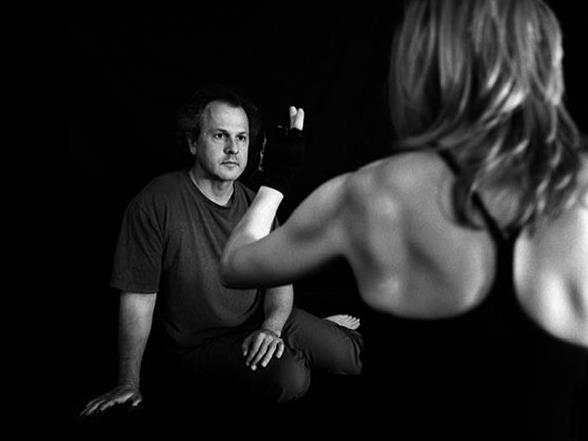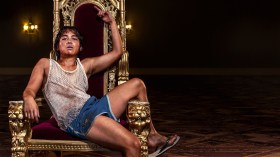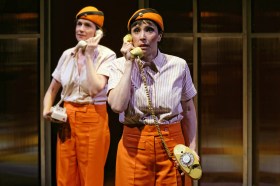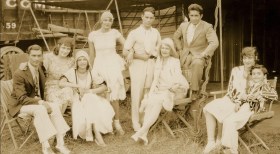If you have read celebrated Australian writer Peter Goldsworthy’s novel Wish, you’ll go to director Humphrey Bower’s production for Night Train Productions convinced there is no way that so complex a book—incidentally starring a teenage female gorilla—can be staged. You’d be proved wrong.
For one thing, Goldsworthy’s book manages to incorporate Auslan (Australian Sign Language) images, but as the author himself has noted, ‘Sign seems made for the theatre.’ As a result, the fact that Wish the play is scripted partly in sign language feels entirely right and natural. Nonetheless, as Goldsworthy has also said of the play, ‘…as with all adaptations, you lose things, but you also gain things.’
If you haven’t read this extraordinary book, you’re in for a compelling, sometimes confronting evening with the play. True to Goldsworthy’s original story, it courageously explores giant universal themes, from the delicate inner workings of human communication and the world of the disabled (specifically the deaf), to animal rights, scientific experiment, ethics, the nature of love, sexual morality, and the blurring of boundaries between humans and animals.
Only at one level is this a story of human sex with a gorilla, although it is that too… The story skilfully prepares you for this shock, so that by the time you are brought to this point, you have almost total empathy with the protagonists. You can now consider calmly the intriguing questions posed towards the end: is an animal that has been taught to ‘talk’ (via signing) still an animal, and in the context of a genuine human-animal love affair, does an act of inter-species congress constitute ‘unlawful carnal knowledge of a minor’, or just plain bestiality?
The fact that such themes can be discussed meaningfully in an engaging storytelling framework and within the space of an hour and 45 minutes, with only three people onstage (one of whom is musician Leon Ewing, mood-creating on the guitar) and no set or props, is a near miracle. Dramatic moments are reliant on Andrew Lake’s largely sensitive lighting design (although the full-flood exposure for director Humphrey Bower’s scene stripped to his jocks seemed unnecessarily harsh).
The two actors holding the stage are director Bower as ‘JJ’, the hearing son of deaf parents raised in the world of Auslan sign language, and pliant dancer Danielle Micich as ‘Eliza’ alias ‘Wish’ the young gorilla. Micich’s wordless physicality is glorious to behold; powerfully muscled, she becomes a gorilla.
There are four scripts in play here: JJ’s spoken English script, combined with his signing script, a constant manual interpretation of his story; and Micich’s spellbinding corporal embodiment of the gorilla, from prehensile toes to knuckle-walking and acrobatic somersaults, again combined with the animal’s escalating use of signing after JJ is assigned to teach her Auslan (which Bower has himself studied).
As if this were not enough, Bower manages to channel not just his own JJ character, but also JJ’s deaf mother and father, and the patrician tones of the two animal rights campaigners, zoologist Clive and his wife poet-veterinarian Stella, who first introduce JJ to their ‘foster-daughter’ Eliza the gorilla, ‘rescued’ (stolen) from a scientific research laboratory. Bower, a consummate story-teller, never drops the audio ball: you know which character he is at any one time, and you can decipher even the softest feminine whisper when he depicts his mother’s disabled voice. Through his JJ character, he keeps the faith with Goldsworthy’s book, often relaying substantial chunks of the original prose.
Amusingly but perhaps also pointedly, Clive and Stella are portrayed with crisp upper-class English accents. Wish the gorilla initially is named ‘Eliza’, another possibly pointed reference, this time perhaps to Eliza Doolittle in George Bernard Shaw’s Pygmalion (My Fair Lady)? Certainly, Clive and Stella are every bit as much meddlers with Wish’s basic animal nature as is Professor Higgins with Eliza Doolittle’s working-class simplicity; ironically, they are also as much callous experimenters on a ‘dumb’ animal as are the scientists from whom they believe they have saved the gorilla. They are responsible for Wish’s ultimately tragic end.
This intense play is about so many wildly different things that it’s hard to pin down to a central meaning. In its closing moments, this passage of Goldsworthy’s, voiced by JJ, perhaps indicates that we shouldn’t even try to do so:
I tried to imagine a sign-language in which the movement of the hands was reversed, in which the direction of the past was straight ahead, the future behind. Because surely we are all walking backwards, blindly, into the future. We know not where we go—we cannot see it. It is the past that is always with us; we must face it forever.
Rating: 4 out of 5 stars
Wish
A co-production with Night Train Productions; originally supported by The Blue Room Theatre
Presented by Perth Theatre Company
Based on the novel Wish by Peter Goldsworthy (1995)
Adapted & directed by Humphrey Bower
Choreographer: Danielle Micich
Lighting Designer: Andrew Lake
Music: Leon Ewing
Associate Lighting Designer: Joe Lui
Stage Manager: Lisa McCready
Cast: Danielle Micich & Humphrey Bower
State Theatre Centre of WA, Studio Underground, William St
www.statetheatrecentrewa.com.au
14–24 May





